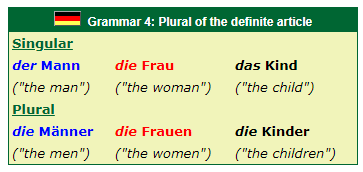Indefinite articles
In the last chapter we discovered that German nouns have genders, and that the gender of a noun affects the form of the definite article. This is also true of the German equivalents of "a" and "an" as in "a man" and "an occupation".
The grammatical term for this is the indefinite article. The different forms of the German indefinite article are listed below for each gender. Note that both the masculine and neuter forms are identical when the noun is the subject of the sentence.

The plural of definite and indefinite articles
The definite article of a plural noun is always "die", regardless of gender, as the table below displays:

Just as in English, the indefinite article disappears in the plural in German. So just as the plural of "a son" in English is "sons", the plural of "ein Sohn" is "Söhne".
The word "kein"
The simple translation of the German word "kein" is "no" as in Müslüm Can's statement: "Ich habe keine Kinder" (= I have no children).
However "kein" is also used to translate "not a". The literal translation "nicht ein" should be avoided. Thus you could either translate "Ich habe keine Kinder" as "I don't have any children" or "I haven't got any children".
As far as endings are concerned, "kein" behaves just like the indefinite article "ein":

But these are only the endings for "kein" when it is the subject of a sentence i.e. in a sentence such as "No child was unhappy". But "kein" is used most often to describe the objects of sentences and takes quite different endings. We will discover what these are in the next section.
 英语
英语 日语
日语 韩语
韩语 法语
法语 西班牙语
西班牙语 意大利语
意大利语 阿拉伯语
阿拉伯语 葡萄牙语
葡萄牙语 越南语
越南语 俄语
俄语 芬兰语
芬兰语 泰语
泰语 丹麦语
丹麦语 对外汉语
对外汉语

